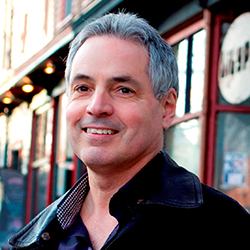Robert J. Sampson Ph.D.
 Director of the Boston Area Research Initiative
Director of the Boston Area Research Initiative
Henry Ford II Professor of the Social Sciences
Harvard University
Email: rsampson@wjh.harvard.edu
Discipline: Sociology, Criminology
Expertise: Urban Health, Neighborhood Health, Social Networks
Investigator Award 
The Community Context of Well Being: A Longitudinal Study of Social Mechanisms and Neighborhood ProcessesAward Year: 2004 Medical care in the United States tends to focus on individuals, while our public health system (local, county, state, national) focuses on the health of various populations. After more than a decade of studying human development at the community level, Robert J. Sampson, Ph.D. turns his attention to the neighborhood foundations of well-being and the geographic concentration of compromised health. His Investigator Award project, The Community Context of Well-Being: A Longitudinal Study of Social Mechanisms and Neighborhood Processes, explores social aspects of neighborhood life that relate to health, such as cohesion, informal social controls, spatial diffusion of network ties, leadership connectivity, and moral cynicism, among others. The project links several sets of original data to study social mechanisms and institutional processes as they change over time across Chicago neighborhoods. By identifying these mechanisms, Dr. Sampson aims to better understand how and why communities matter for health and to develop advanced methods of monitoring community health and well-being that can be used to inform the design of more effective and localized interventions.
Background 
Robert J. Sampson is the Henry Ford II Professor of the Social Sciences, director of the Boston Area Research Initiative and former chair of the department of sociology at Harvard University. Before that he taught for twelve years in the department of sociology at the University of Chicago and seven years at the University of Illinois. Sampson was a Senior Research Fellow at the American Bar Foundation from 1994-2002, and in the 1997-8 and 2002-3 academic years he was a Fellow at the Center for Advanced Study in the Behavioral Sciences in Stanford, California. In 2005 he was elected a Fellow of the American Academy of Arts and Sciences. Professor Sampson's research interests center on crime and deviance, the life course, neighborhood effects, and the sociology of the modern city. In the area of neighborhood effects and urban sociology his current work is focusing on the community-level context of well being, race/ethnicity and mechanisms of ecological inequality, the social meanings of disorder, the network structure of community influence, civic engagement, and other topics linked to community-level social processes. Much of this work stems from the Project on Human Development in Chicago Neighborhoods, for which Sampson serves as scientific director. He is also engaged in a longitudinal study from birth to death of 1,000 disadvantaged men born in Boston during the Great Depression era. Two publications from this project?Crime in the Making: Pathways and Turning Points Through Life (Harvard, 1993) and Shared Beginnings, Divergent Lives: Delinquent Boys to Age 70 (Harvard, 2003), received the distinguished book award from the American Society of Criminology, the Academy of Criminal Justice Sciences, and the Crime, Law, and Deviance Section of the American Sociological Association.
- Sampson, R.J. Collective Efficacy Theory: Lessons Learned and Directions for Future Inquiry, In Taking Stock: The Status of Criminological Theory (Advances in Criminological Theory, Vol. 15), eds. Cullen, F.T., Wright, J.P., Blevins, K. Transaction Publ
- Sampson, R.J. How Does Community Context Matter? Social Mechanisms and the Explanation of Crime, In The Explanation of Crime: Context, Mechanisms, and Development, eds. Wikstrom, P.O., Sampson, R.J. New York and Cambridge: Cambridge University Press, 31
- Sampson, R.J. Disparity and Diversity in the Contemporary City: Social (Dis)Order Revisited. British Journal of Sociology, 2009, 60: 1-31.
- Sampson, R.J., Graif, C. Neighborhood Social Capital as Differential Social Organization: Resident and Leadership Dimensions. American Behavioral Scientist, 2009, 52(11): 1579-1605.
- Sampson, R.J. Racial Stratification and the Durable Tangle of Neighborhood Inequality. Annals of the American Academy of Political and Social Science, 2009, 621: 260-80.
- Graif, C., Sampson, R.J. Spatial Heterogeneity in the Effects of Immigration and Diversity on Neighborhood Homicide Rates. Homicide Studies, 2009, 13: 242-60.
- Odgers, C., Moffitt, T., Tach, L., Sampson, R.J., et al. The Protective Effects of Neighborhood Collective Efficacy on British Children Growing Up in Deprivation: A Developmental Analysis. Developmental Psychology, 2009, 45: 942-57.
- Sampson, R.J. After School
- Sampson, R.J., Sharkey, P., Raudenbush, S.W. Durable Effects of Concentrated Disadvantage on Verbal Ability among African-American Children. Proceedings of the National Academy of Sciences, 2008, 105(3): 845-52.
- Sampson, R.J. Moving to Inequality: Neighborhood Effects and Experiments Meet Social Structure. American Journal of Sociology, 2008, 114: 189-231.
- Sampson, R.J., Sharkey, P. Neighborhood Selection and the Social Reproduction of Concentrated Racial Inequality. Demography, 2008, 45(1): 1-29.
- Sampson, R.J. Rethinking Crime and Societal Change. Contexts, 2008, 7: 28-33.
